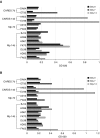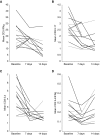The Immunopathologic Effects of Mycoplasma pneumoniae and Community-acquired Respiratory Distress Syndrome Toxin. A Primate Model
- PMID: 28915064
- PMCID: PMC5805996
- DOI: 10.1165/rcmb.2017-0006OC
The Immunopathologic Effects of Mycoplasma pneumoniae and Community-acquired Respiratory Distress Syndrome Toxin. A Primate Model
Abstract
Mycoplasma pneumoniae infection has been linked to poor asthma outcomes. M. pneumoniae produces an ADP-ribosylating and vacuolating toxin called community-acquired respiratory distress syndrome (CARDS) toxin that has a major role in inflammation and airway dysfunction. The objective was to evaluate the immunopathological effects in primates exposed to M. pneumoniae or CARDS toxin. A total of 13 baboons were exposed to M. pneumoniae or CARDS toxin. At Days 7 and 14, BAL fluid was collected and analyzed for cell count, percent of each type of cell, CARDS toxin by PCR, CARDS toxin by antigen capture, eosinophilic cationic protein, and cytokine profiles. Serum IgM, IgG, and IgE responses to CARDS toxin were measured. All animals had a necropsy for analysis of the histopathological changes on lungs. No animal developed signs of infection. The serological responses to CARDS toxin were variable. At Day 14, four of seven animals exposed to M. pneumoniae and all four animals exposed to CARDS toxin developed histological "asthma-like" changes. T cell intracellular cytokine analysis revealed an increasing ratio of IL-4/IFN-γ over time. Both M. pneumoniae and CARDS toxin exposure resulted in similar histopathological pulmonary changes, suggesting that CARDS toxin plays a major role in the inflammatory response.
Keywords: asthma; community-acquired respiratory distress syndrome toxin; mycoplasma; primate model.
Figures



References
-
- Sembajwe G, Cifuentes M, Tak SW, Kriebel D, Gore R, Punnett L. National income, self-reported wheezing and asthma diagnosis from the World Health Survey. Eur Respir J. 2010;35:279–286. - PubMed
-
- Global Initiative for Asthma. Global strategy for asthma management and prevention. 2016 [accessed 2016 Dec 1]. Available from: http://ginasthma.org/2016-gina.
-
- Berkovich S, Millian SJ, Snyder RD. The association of viral and mycoplasma infections with recurrence of wheezing in the asthmatic child. Ann Allergy. 1970;28:43–49. - PubMed
-
- Seggev JS, Lis I, Siman-Tov R, Gutman R, Abu-Samara H, Schey G, et al. Mycoplasma pneumoniae is a frequent cause of exacerbation of bronchial asthma in adults. Ann Allergy. 1986;57:263–265. - PubMed
-
- Lieberman D, Lieberman D, Printz S, Ben-Yaakov M, Lazarovich Z, Ohana B, et al. Atypical pathogen infection in adults with acute exacerbation of bronchial asthma. Am J Respir Crit Care Med. 2003;167:406–410. - PubMed
Publication types
MeSH terms
Substances
Grants and funding
LinkOut - more resources
Full Text Sources
Other Literature Sources
Medical

